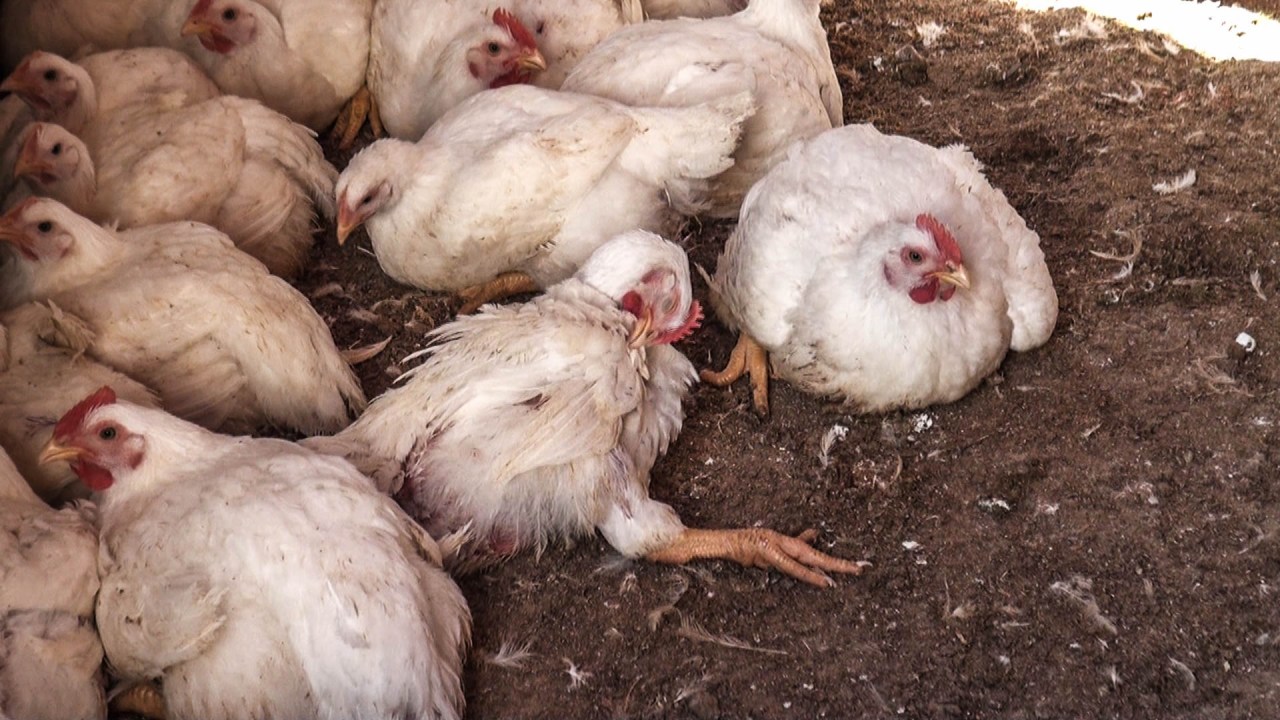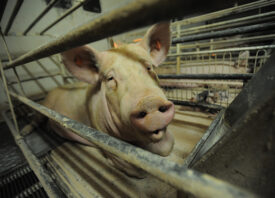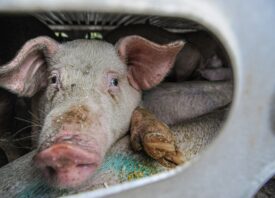Search this site
The Undercover Journalist Who Became a Vegan Farmer


In 2013, Rich Hardy was inside a factory pig farm in Northern Italy when he discovered a sow in the corridor, immobile and alone. “Unable to move her back legs, she had been dragged out of her crowded pen and was propped up against a wall,” he remembers. She bore a dark pink line along the length of her back, an indication that she was injured.
As a result of that injury, the sow would be used as “second-grade meat”; her body would end up in pet food. As he was working undercover, Hardy was unable to help the wounded pig, who was in too much pain to reach a feeding trough. “She would have to wait two days without food, water, or medical care before the pet food truck came to collect her for slaughter,” he tells me.
Hardy worked undercover as an environmental and animal protection activist for more than two decades. His work took him to more than thirty countries, though he considers himself a citizen journalist and “visual-evidence gatherer” rather than a photographer in the traditional sense. The book Not As Nature Intended is the stunning culmination of the stories recorded in his investigative journals over the years.


During that time, he visited several pig farms across Italy and Poland. On another farm, he found pigs with eyes red from conjunctivitis; when he moved his hand in front of them, they showed no signs of registering his presence. Their tails had been cut off to prevent chewing and cannibalism, behaviors that are common among factory-farmed pigs due to the stress and extreme boredom of confinement.


Hardy’s work wasn’t limited to pigs; his advocacy took him around the world and face-to-face with countless animals. When covering a rabbit factory farm, he witnessed the insemination of does, who were roughly removed from their cages before having their tails lifted and plastic tubes thrust inside them. Some were so sick from conjunctivitis that their eyes had crusted over. Others had severe ear infections. In one cage, he found a tiny kit dead in the corner.


When he posed as a prospective buyer of a chicken factory farm, he encountered birds made so large (by genetic selection) that their legs splayed under their weight. While documenting the factory farming of quails, he noticed animals on one farm who had bumblefoot–a swelling of the foot caused by infection. He held one tiny quail gently in his hands, feeling her heartbeat, before putting her back down with a whispered apology only she could hear.
Following the completion of Not As Nature Intended, Hardy retired from his career as a visual-evidence gatherer. Along with his partner Pru, he went on to found Lazy Meadow Farm in Cornwall. In addition to running the vegan farm, they have a micro-sanctuary for animals. The cats and dogs were rescued from animal shelters, but many of the residents come from factory farms like those Hardy once visited undercover. Idris the duck, for example, had lived his entire life in a dark shed, without access to water for swimming. They saved him on the day he was scheduled to be slaughtered.

“Just hours from the chop, Idris’s life changed completely in just a few short hours,” the journalist remembers. “That day, and alongside two other ducks, Silvia and Tea, Idris found out what it is like to truly be a duck. Freedom to move, to make choices, to behave naturally. He had 24/7 access to a pond, which ducks need more than anything else.
“While Idris was definitely scarred by his experiences in the factory farm, I could watch him at a distance enjoy living out his life without daily fears. I kept my distance, but I knew he was happy waddling in formation with the girls.” Idris passed away suddenly in August of 2021, with the probable cause being a virus. Tea died soon after, likely of a broken heart.
If Hardy gave Idris a second chance at life, Idris and the other animals have given the journalist a reason to hope. “Both the micro-sanctuary and the farm have been instrumental in helping me to process what I’ve witnessed over the course of twenty years,” he says now. “I think it would have been quite easy to walk away from the investigative work feeling I’d done my bit and that things aren’t going to get any better. Just run to the hills, baton down the hatches, and shut the world out.
“Rescuing our first dog, though, helped show me that I could do something for one animal, having spent years filming the plight of animals only then to walk away. Though I never felt I was turning my back on them, it was never easy to leave. Now giving a home to chickens, ducks, cats, and dogs who were just days away from death gives me a purpose and an opportunity to keep telling stories about animals, just from a different perspective.”
Recently, Hardy has focused on caring for these individual animals, but his work and the work of investigators like him continue to inspire change for animals on a massive scale. “While it’s not clear-cut, I think the European Union’s banning of barren battery cages for egg-laying hens in 2012 forced open a little crack in the factory farm door,” he says. “While it didn’t end cages completely for hens, it required farmers to make significant changes and led to a reduction in cage egg sales.
“It’s also made lobbying for a complete ban on cage systems more of a reality. That’s being shown by recent votes from both the European Parliament and European Commission, who are talking of banning cages for all farm animals in factory farms. Since I began campaigning for farm animals in 1993, the gaps between legislative victories for farm animals are narrowing. When previously it took decades for change to take place, now it can just a few years or even less.”
At Lazy Meadow Farm, Hardy and his team have an open-gate policy. “The community can drop in and see what we do,” he explains. “That’s a big difference to the closed doors of the factory farm where food comes at a huge cost, especially to the farm animals. Vegan farms are few and far between, but they can offer nutrient-packed, local, seasonal food that can help communities not only thrive but become better connected with their food.
“We need examples of how we can grow food for communities in a kinder way if we’re going to end the suffering for caged and crated animals. The mantra at our farm is ‘No Blood, No Bones, No Shit.’ We believe in agriculture that builds soil health and fertility without supporting animal cruelty. We work with nature’s cycles, and we accept that we will always lose a portion of what we grow to the wild insects, birds, and mammals who share our farm. That’s okay; they are our neighbors.”
Hardy cherishes every day at the farm, but he most looks forward to the weekly harvest. “We pick our veggies early in the morning and then just an hour or two later they’re in the kitchens of our customers,” he tells me. “It feels good to be able to feed people, but not at the expense of our animal companions.”
Though they’ve all been slaughtered now, Hardy hasn’t forgotten the many pigs, rabbits, chickens, and quail he met in dark cages, pens, and warehouses. “Some days, I look into the eyes of my dogs or cats and see the eyes of some of the animals I’ve documented,” he admits. “I’ll often think about that poor pig I found left uncared for in an Italian factory farm when I look into the eyes of Bryher, our collie cross. Just the way Bryher sits can be a chilling reminder of how I found that poor sow, sat on her haunches in a dank corridor. When you have reminders like that, it’s hard to look away.”
Order your copy of Not As Nature Intended here, and learn more about Rich Hardy’s investigative work on Instagram at @notasnatureintended. You can follow Lady Meadow Vegan Farm at @lazy.meadow.farm.





